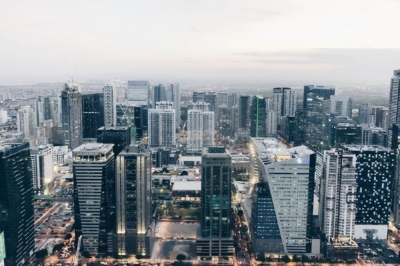The real estate market in the Philippines finished strong in 2019, as major cities around the country showed good and promising performances. A local year-end report from Lamudi illustrated that property seekers were more interested in buying (60.59%) than renting (39.41%) last year, with budgets being able to accommodate assets up to P20 million despite inflation and house price growth. The rise of foreign investors and BPOs have also contributed to the economy’s growth and real estate ownership, with no signs of slowing down. These opened up a ton of opportunities in the corporate, residential, and retail sectors nationwide.
With conditions like this, there were generally optimistic projections leading up to 2020. However, no one could have predicted that a pandemic would put the world to a halt and have concerning effects on the state of the economy.
Some analysts have previously expressed that the Philippine real estate industry would remain resilient even in the case of a global economic downturn. But just how well did the sector do in 2020?
Philippine Real Estate Market Overview
Condominiums
The Philippines is now facing the worst economic downturn in three decades because of COVID-19. According to Colliers International, prices are set to drop by 15%. This will be coming from a slight 0.87% rise in the price of a luxury 3-bedroom condominium unit in 2019 at PHP232,000 (USD 4,488) per sq. m. While minuscule, it is still a dramatic slowdown from the 15.5% YOY rise in 2018, and also the weakest performance since 2009.
The trend continued in Q1 of 2020 when 3-bedroom condominium prices dropped by 1.65% YOY. This is after eight years of uninterrupted house prices, showing that the demand has weakened since offshore gaming and outsourcing services were temporarily put to a halt due to the pandemic.
House and Lots
With the prices falling, Chinese real estate investors are looking to get a bigger slice of the pie, as they wait for a rush sale when real estate holders are forced to sell at whatever price to get a buyer. This price drop is expected as long as community quarantine measures and travel restrictions are still in place.
Despite this little hiccup, the Chinese buyers are still optimistic about the Philippine economy. As they purchase more real estate properties at lower prices, they lie in wait for their investments to yield good returns.
Commercial and Office Spaces
The Philippine real estate industry is expected to recover, albeit over time. According to a study, growth is seen to happen within 18 to 24 months, which is mostly driven by new segments, specifically logistics, due to the rising cold storage demand and the growing ecommerce sector.
The logistics industry is forecasted to grow 160,000 per year in the next decade with the demand for better quality facilities to meet the needs of accelerated adaptation to ecommerce platforms, a stronger supply chain risk management, and the expansion of last-mile fleet―the movement of goods from a logistics hub to its final destination―are seen to be addressed by the real estate market. This will allow it to grow by 56% in five years and a huge 125% in the next decade.
Philippine Property Market Predictions for 2021

1. COVID-19 causing a reduction in office demand for Philippine Offshore Gaming Operators (POGOs)
Before the pandemic happened, Philippine offshore gaming operators (POGOs) were one of the biggest contributors in the growth of the country’s real estate sector. However, the exodus of these businesses has left behind numerous properties empty—more than a tenth of Metro Manila offices, to be specific. This is due in part to the lack of business brought about COVID-19 and the fear of most Chinese workers contracting the disease in the country.
With the government mandate for establishments such as POGOs to operate at only 30% of their capacity, it seems they have been shelling out more money on housing and food for their employees versus raking in profit for the business.
These empty office spaces will be a large gap to fill in the coming years, freeing properties for rent or sale to local businesses. While the recovery from the pandemic may be the reason for POGOs to return, it is unclear when this will be.
2. Rise in Real Estate Investment Trusts (REITs) driving increased demand
More property companies have expressed interest in having a go at the business model with regulators approving the rules and processes surrounding real estate investment trusts (REITs). Real estate giants are already filing to operate REIT subsidiaries.
Santos Knight Frank explains that REITs bring an opportunity to democratize the Philippine real estate market. By allowing small investors to pitch in high-value real estate assets, revenue is higher. It is similar to publicly trading stocks and having the opportunity to own properties alongside major corporate institutions—something that many Filipinos could be interested in.
That said, it is going to be a huge factor in real estate market trends in the coming years. REIT-generated capital can even enable the real estate industry to expand outside the Metro and create more job opportunities.
3. Expansion of co-working spaces driving commercial demand
The co-working space model has been a tried and tested hit in the Philippine market, with more than a hundred in Metro Manila alone—and there are no signs that the emergence of new players will slow down. As other parts of the country continue to develop, there is a strong projection for the expansion of the co-working sector in Cebu. 3% of the office market in the city is now occupied by co-working spaces, most notably in Cebu IT Park and Cebu Business Park.
The expansion is driven by the surge of freelance workers, startup companies, solopreneurs, and an increasing number of BPO firms that need a quick office space to fulfill their business needs. A number of these co-working space brands are now also single-office tenants.
4. A new focus on sustainability driving new property developments
The tropical climate and location of the Philippines make some of its areas a target of frequent natural calamities and disasters. With this in mind, there has finally been progress on the action and planning of the local real estate industry. They are expected to gear up and address climate change through greener, more sustainable, and energy-efficient technology. This will also encompass architectural designs that make properties more resilient to acts of God.
The use of LEED (leadership in energy and environmental design)-certified sustainable buildings does not only future-proof real estate properties, but it also allows the successful development of more buildings and structures at a lesser cost. This includes the ability to withstand shaking due to earthquakes and strong winds.
More than 300 buildings in the Philippines have begun implementing LEED guidelines, and half are already LEED-certified. Bonifacio Global City in Taguig, a business district and home to upscale condos, has pioneered the shift to greener real estate developments. Reports show that 100% of new office buildings in BGC are LEED-certified.
5. Foreign executive workers driving demand for luxury properties
Metro Manila is one of the fastest-growing players in the luxury property sector, ranking eighth globally and third in Asia. The prime residential market increased by 6.5% in Santos Knight Frank’s Prime International Residential Index. The city is seen as an excellent location for both foreign investors and executives, as well as high net worth Filipinos. The limited supply of properties, however, spells an increase in demand–and perhaps of prices.
To make up for this, a total of eight residential projects were launched in Q4 of 2019 to fill the supply gap. These include Gardencourt Residences by Ayala Land, Parkford Suites Legazpi by Alveo Land, and The Seasons Residences Natsu Tower. More are foreseen to be on the way.
6. Business Process Outsourcing (BPO) industry to remain strong
BPOs have long been recognized as key drivers of the office market, and things are only bound to get stronger. Research shows that the demand for BPO office spaces will continue to grow annually at 3-7%. This also includes the expansion of established companies outside Metro Manila, namely in Cebu and Davao. There is an estimate of about 788 BPO companies composed of large and SMEs, a number that will likely increase as outsourcing companies contribute by giving more job opportunities to Filipinos.
The pandemic has also largely affected the sector, with Philippine businesses feeling the negative impact of the international health crisis as early as the second week of March. Even so, the Philippine Economic Zone Authority (PEZA) reported a 37% increase in IT-BPO investment pledges from January to July 2020. For comparison, investments totaled PHP8.32 billion ($172 million) in the same period in 2019, while it reached PHP11.4 billion ($235 million) in 2020.
7. Growth of multiple logistics hubs drive an increase in office demand
COVID-19 has seen to it that the logistics industry is an essential business–and will therefore continue to expand. With land transportation improving through new roadways opening up, the logistics real estate sector is projected to increase. This will most likely be in the north and south of Metro Manila, with the corridor NLEX-SCTEX-TPLEX in North Luzon and the CALABARZON region being the main hotspots.
These hubs would prove to be central to both foreign and domestic shipments as e-commerce continues to strengthen due to the pandemic. It is believed that this will aid in the rehabilitation of the real estate sector. The logistics industry is expected to grow by 160,000 sqm annually in the next decade, along with better facilities.
Doubt is Out, PH Real Estate is In
Despite COVID-19, the Philippine real estate market seems to have survived one of the worst economic downturns in decades. If there were any concerns about the performance of the PH real estate industry, it has probably been replaced with interest and curiosity.
With many emerging developments and optimistic projections for the future, there’s no better time than now to dip your toes and consider real estate investments in the Philippines. Currently, prices are low, which opens a slew of possibilities to investors.
Remax Gold can be your property investment partner. As experts in the industry, we can assist you in selecting the top options you have. Contact us today to learn more about our full real estate services.



